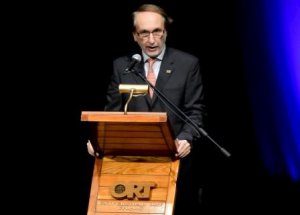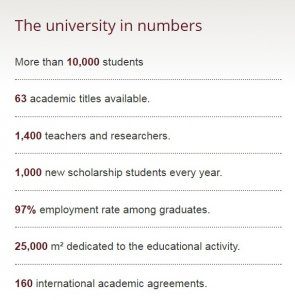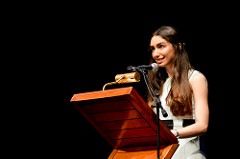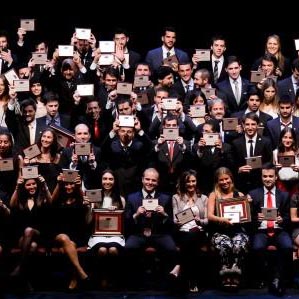ORT Uruguay University has grown to such an extent that it now holds three graduation ceremonies every year, each one filling Montevideo’s largest venue, the Teatro Solís, to capacity. Here is an extract (translated from the original Spanish) from the address given to graduates at this month’s ceremony by University Rector Dr Jorge Grunberg.

Dr Jorge Grunberg: “We must break the vicious circle in which inability to afford a good education prevents people from earning enough to buy their children a good education.”
“Dear graduates, a new world awaits you. A world of opportunities based on knowledge and creativity. In this new world geographic distance and direction and geopolitical magnitude are not as significant as they once were. In a world where wealth is created from intelligence, everything is possible. Dependence is now only in our minds.
“One thousand years ago the essential question was: who owns the land? Because in land resided wealth and power. One hundred years ago the question was: who dominates the factories, the means of production? That left us with almost a century of political Marxism. In our, new world the essential question is: who produces knowledge?
“The strategic challenges for countries are no longer to increase territory, equip armies or find oil. The challenges of the new era are to cultivate and attract talent, promote entrepreneurial culture, and encourage the creation of innovations. In this new world, progress does not require speeches but studies; it does not require class struggle but assistance to classes; it does not require armies but lyceums and universities.
 “But in this new world there will be a continual race between education and technology. Knowledge will become
“But in this new world there will be a continual race between education and technology. Knowledge will become
obsolete at an ever faster rate. The first and second industrial revolutions were energy transformations, they sought to replace animal and human force with the energy of steam or electricity. The third industrial revolution was a computing transformation which made it possible to replace calculations and manual files with automatic and digital systems. The fourth revolution, which is your turn, aims to replace human intelligence with artificial intelligence; that is why it is a revolution of knowledge, an epistemological transformation.
“The average time of validity of knowledge will become progressively shorter. The value of memorisation will decrease as access to information increases. Learning and creating knowledge will be transformed into continuous processes: you will not be able to study for a few years and then work for many more, the two will combined, ongoing activities.
“In this society the value of people will depend not only what they know but also their ability to learn. For this reason, offering a quality education to all citizens is a moral imperative. We must break the vicious circle in which inability to afford a good education prevents people from earning enough to buy their children a good education.

Economics graduate Eugenia Rodríguez told the ceremony: “Abraham Joshua Heschel once said, ‘To be or not to be is not the question, the vital question is how to be and how not to be…’ From now on, we will choose our path, we will choose how to be. We will act in accordance with our experience, our mind and our heart. We must become an optimal version of ourselves, to build a better world. Fortunately, we have excellent tools to do so.”
“This new world contains opportunities and threats; but if we aspire to develop in the knowledge society we should not allow the latter to paralyse us. Rather, we should focus on opportunities: we must occupy ourselves with the quality of high school graduates in Finland, the number of doctors in Korea, the speed of entrepreneurship in Israel or the reformulation of the value of natural resources in New Zealand. By not acting in the face of the real strategic problems that we face we are moving the costs of our inevitable adaptation to future generations, we are transferring our problems to our children – and this is not an ethically acceptable option for any mature and responsible society.”





